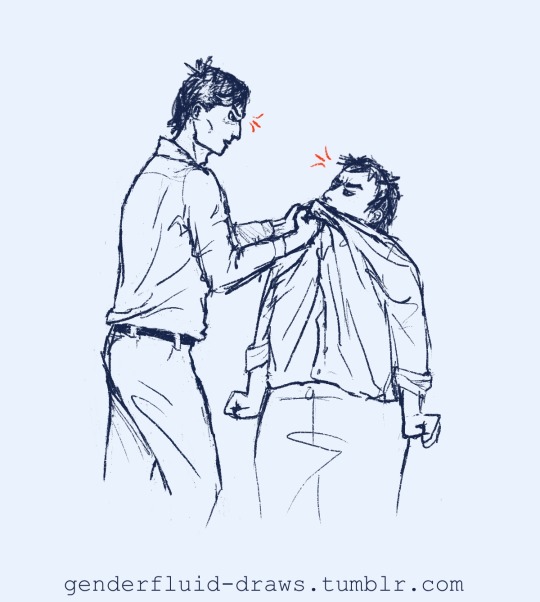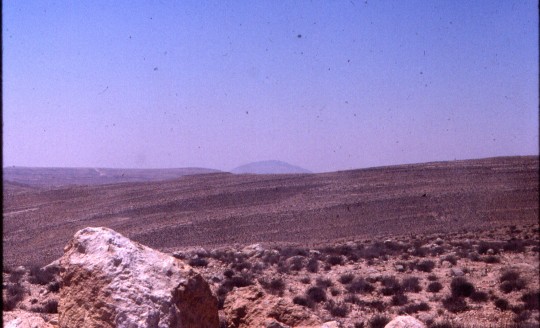#i love short king john doe so. so much. he is already so indignant about every part of mortal life
Text

[ID copied from alt text: A rough sketch of Arthur Lester grabbing John Doe by the front of the shirt. Arthur towers over John, who has to tilt his head up to glare at Arthur. John’s fists are clenched at his sides. Little red marks indicate that both of them are angry. End ID]
@organchordsandlightning’s fic formaldehyde asks the bold question: what if you were a god but your roommate was taller than you
#malevolent#malevolent podcast#malevolent fic rec#formaldehyde - case of the missing lilly#the newest chapter has so much good tension#we got a shirt grab and it’s not even my birthday#i love short king john doe so. so much. he is already so indignant about every part of mortal life#AND he can’t even loom over people#what kind of injustice#john doe#arthur lester#malevolent fan art#formaldehyde fic
33 notes
·
View notes
Text
"God, Stress, and Abundant Lives” based on 1 Kings 19:4-8
I'm mad. Mad that we – the big collective we – might have beaten this virus if we trusted our experts and prioritized collective well-being. Mad that we “can't have nice things” still, EVEN THOUGH science provided amazing vaccines in an unbelievably short time. Mad that I have to make decisions no one– including me – likes because the first rule of John Wesley is “first do no harm” and I really believe we have to do that.
But, a friend sent an article this week that pointed out that I'm not mad. I just think I'm mad. Or, more so, that anger is a secondary emotion that works well to mask primary emotions. The article said the emotion that I'm actually feeling is fear. (Note: do not try this at home. Do not tell someone what they're “really feeling” when they tell you what they ARE feeling. Really, truly. DO NOT DO THIS. The article got away with it by taking about generic people and I personalized.) The article speaks about people choosing not to be vaccinated and vaccinated people's anger responses:
Though this new flavor of outrage might look and sound like righteous indignation, mental health professionals say that what’s behind it is fear.
“It’s scary to admit that somebody else has power over you and you’re at their mercy and you’re afraid of them, but showing that is not a very American ideal,” said David Rosmarin, an associate professor of psychiatry at Harvard Medical School and a clinician at McLean Hospital. “Instead of expressing that fear, it’s a lot more comfortable to blame somebody else.”
Anger is what people in his profession refer to as a “secondary emotion.” It’s a feeling that arises in response to a more primal emotion, like fear and anxiety over having some aspect of your life threatened. “The reality is that there are millions of people who are miseducated about something, they’re making a big mistake that will have massive consequences that might affect you and your family and that makes you scared,” Rosmarin said. “But nobody is saying that.”1
That article also says that part of what people are struggling with is that this was always going to be a “long war” but we didn't get that message from the outset. That fits for me too, I deal better when I have my expectations set correctly.
Two years ago I preached on this passage from 1 Kings 19, and afterwards several of you mentioned that you could hear in it my yearning for a break. (It was fairly soon before my renewal leave.) I hadn't meant to be that transparent then, and it makes me want to be a little bit cautious now, but....the story hasn't changed.
This remains a story of Elijah, prophet of God who has worked diligently for what he believed God wanted him to do. The response to his faithfulness has been a threat of murder that came directly from the palace.
Elijah is too tired to fight anymore. He fled for his life, but in the midst of the flight he lost even the will to live.

He prays, asking God to let him die, which would at least be less violent than the death otherwise planned for him. He'd walked into the desert for a day, and when he prayed he sat under a single broom tree, the only bit of respite he could find. The Bible seems to suggest this is a particularly sad story, it is the same one told of Hagar, having walked into the desert, exhausted her provisions, sat under a broom, and prepared to die. Just like with Hagar though, God meets Elijah there.
You may already know how much I love this story. He falls asleep, and wakes up when provisions have arrived. He eats, he drinks, he falls back asleep. When he awakes, provisions have arrived. He eats, he drinks, AND THEN he was able to go on.
I really love that he needs to sleep, eat, drink, sleep, eat, and drink before he can rouse himself. He has gone far beyond the “have a cup of coffee and keep going” point. He is exhausted. He is out of will power. He is out of a will to LIVE. If I were writing this story though, I'd add in some breathing. “He took intentional deep breathes until he was able to slow his body enough to sleep...” and then the rest of the story. It would make it just a smidge better.
Probably because of the book I just read, I'm noticing that the story as written (and more so as adapted), Elijah is given the chance to “complete the stress cycle” in this story. The book is “Burnout: The Secret to Unlocking the Stress Cycle” written by Emily and Amelia Nagoski. In their opening chapter, they distinguish between stressors and stress. They point out that we need to complete the stress cycle, no matter what is happening with the stressors. And they name, concretely, how to do that. The first and best option is to “do literally anything to move your body enough to get you breathing deeply” for 20-60 minutes a day.2 Elijah walking into the desert for an entire day seems to qualify.
The Nagoski sisters offer 6 other ways to complete the cycle though: 1. “deep, slow breaths down regulate the stress response”3, 2. positive social encounters (even causal ones), 3. laughter – but the real deep belly laughter kind, 4. physical affection from someone you trust (they suggest a 6 second kiss between partners or a 20 second hug with someone you like, snuggling a pet), 5. crying, and 6. creative expression. In other chapters they also talk about meditation and spiritual connection, so I'm going to add a #7 – whatever prayer practices work for you. They're suggesting that we do at least one of these, and better many of these, every day. Because the stressors keep coming at us. And their book was written in 2019, so it is WAY MORE TRUE today.
So Elijah. He took a long walk (check), I'm all for pretending he took some slow breaths, he maybe had a positive encounter with the angel? (does that count??), and I'm quite sure he cried a lot, the Bible just forgot to mention it. He also took care of his bodily needs for rest, nourishment, and hydration. (Chapter 7 of their book is all about rest.) He also named his despair to God, and naming emotions has a lot of power too.
This little story has a lot of good responses to despair and burnout. Which is good, because many of us are in despair and/or burnout in at least some aspects of our lives.
The pandemic has challenged all of us. The challenges have differed, because we're different, but we've all been challenged. Having another wave is definitely not helping anybody. We're mad, whether or not that's a primary emotion, sad, fearful, and maybe even detached. We're exhausted.
And most of us are comfort seeking. We want things to be easier. We NEED things to be easier. We're looking for things that sooth, ease, comfort, and console. Often, we're looking for things to be “back to normal,” familiar, and make sense like we're used to. We're human. That's how we work.
Another facet of how we work is that when we're in high stress, we revert to earlier and lower levels of emotional functioning. We blame. We over react. We fight. We flee. We gossip. We triangulate. We take all our anxiety and we try to get rid of it by sharing it with others or throwing it at them. This too is human. It is how we work.
No one I know is operating at their best right now. We can't.
What we can do is seek to complete the stress cycles – we can't change most of the stressors, but we can give ourselves the best possible chance to change the stress. Our bodies, minds, and spirits are all connected, they're all “us.” When we care for each of them, we give all of them a chance to do better.
I believe that God calls us all to life abundant. To full, meaningful, connected lives. To spiritual depth and work that matters and relationships that give life. Elijah went from that broom tree to the Mount of Horeb where he deepened his relationship with God, and then on to meet his protege Elisha and started to pass on his labor to the next generation. It wasn't God's intention that Elijah struggle alone, or burn himself out. It isn't God's will that we struggle alone nor burn ourselves out either. God wishes for full, abundant lives for us all. That's part of why we take care of each other, and share love in the world. So, dear ones, I encourage you to complete your stress cycles, name your emotions, connect with your dear ones, engage in prayer, and live life as abundantly as you can. God wants it for us, we want it for each other, and the world needs us as healthy as we can be! May God help us. Amen
1 https://www.statnews.com/2021/08/02/belated-realization-that-covid-will-be-a-long-war-sparks-anger-denial/
2 Emily Nagoski and Amelia Nagoski Burnout: The Secret to Unlokcing the Stress Cycle (New York: Ballantine Books, 2019) p. 14.
3 Nagoski, 15.
#FUMC Schenectady#Schenectady#UMC#Sorry about the UMC#progressive christianity#Thinking Church#Elijah and the Broom Tree#Rest Food Hydration#Complete the Stress Cycle#DO NOT TRY THIS AT HOME#Nagoski Sisters#fatigue#burnout#Delta Variant#Despair#Abundant Life
3 notes
·
View notes